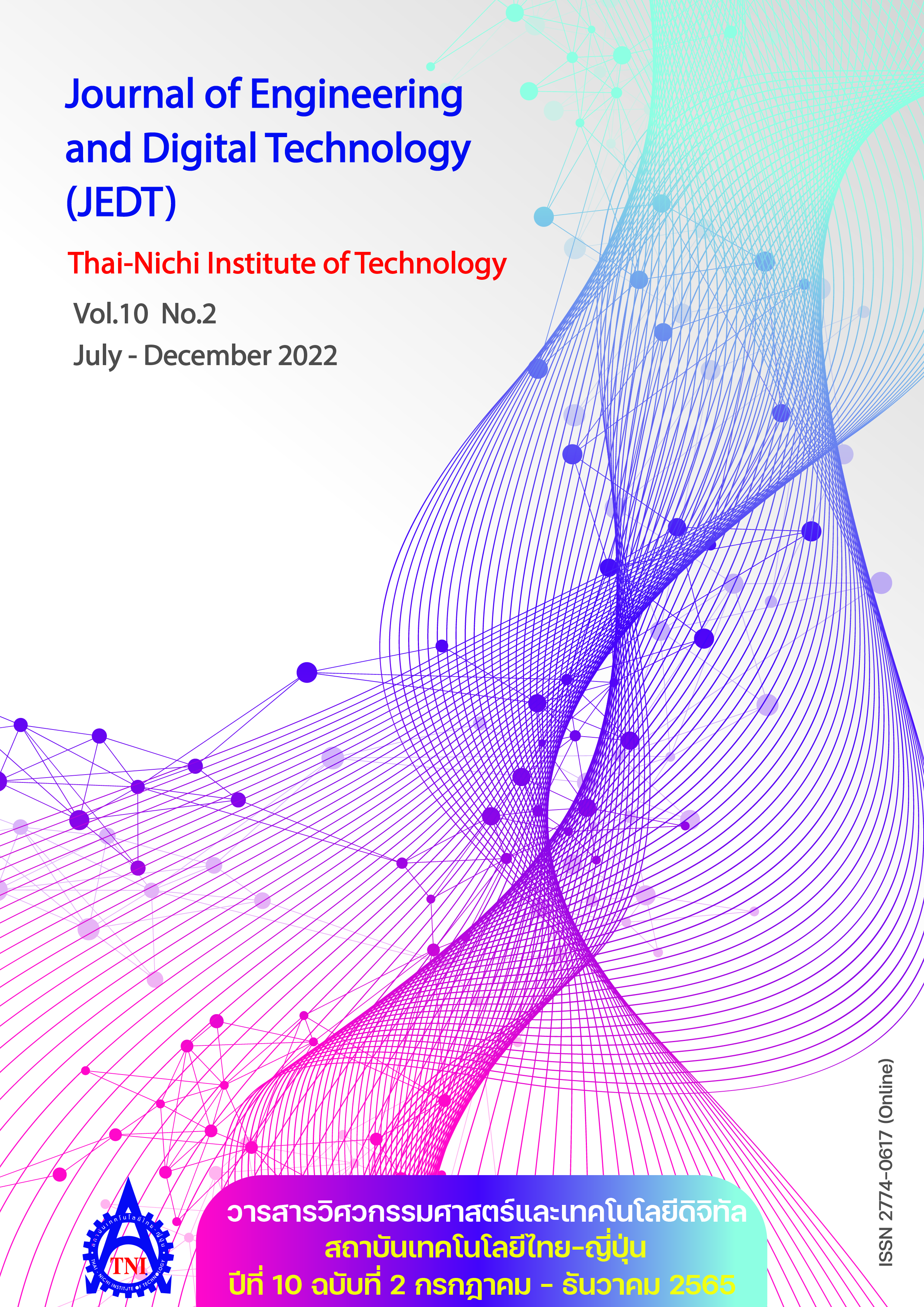Performance Evaluation of Modified Tree Algorithm for Supporting Traffic with Different Priority Requirements
Main Article Content
บทคัดย่อ
In this paper, we are introducing 3 new algorithms that take high-priority services into account for more delay-sensitive multimedia traffic, namely, CFS, DAP type 1 and DAP type 2 algorithms, an extension of Binary tree algorithm. The CFS algorithm can be derived from Binary tree algorithm by setting the access probability of the first slot for class 1 users equal to 1. DAP type 1 algorithm can be obtained from Binary tree algorithm by adjusting the access probability of the first slot for class 1 users to the desired value. DAP type 2 algorithm can be derived from either Binary tree and DAP type 1 algorithm by adjusting the access probability of the first slot for class 1 users and the access probability of the first slot for class 2 users to the desired values. The goal is to make each type of traffic compliant with QoS requirements. The simulation results show that DAP type 2 algorithm has more feasible QoS indexes than the CFS and DAP type 1 algorithms. So it is more efficient and flexible to adjust system parameters to meet QoS requirements than CFS and DAP type 1 algorithm. In addition, we can conclude that the access probability of the first slot for class 1 users and class 2 users are the important parameters that must be set properly. So that the system can control QoS and still maintain high delay performance.
Article Details

อนุญาตภายใต้เงื่อนไข Creative Commons Attribution-NonCommercial-NoDerivatives 4.0 International License.
นโยบายการรับบทความ
กองบรรณาธิการวารสารสถาบันเทคโนโลยีไทย-ญี่ปุ่น มีความยินดีรับบทความจากอาจารย์ประจำ และผู้ทรงคุณวุฒิในสาขาวิศวกรรมศาสตร์และเทคโนโลยี ที่เขียนเป็นภาษาไทยหรือภาษาอังกฤษ ซึ่งผลงานวิชาการที่ส่งมาขอตีพิมพ์ต้องไม่เคยเผยแพร่ในสิ่งพิมพ์อื่นใดมาก่อน และต้องไม่อยู่ในระหว่างการพิจารณาของวารสารอื่นที่นำส่ง ดังนั้นผู้สนใจที่จะร่วมเผยแพร่ผลงานและความรู้ที่ศึกษามาสามารถนำส่งบทความได้ที่กองบรรณาธิการเพื่อเสนอต่อคณะกรรมการกลั่นกรองบทความพิจารณาจัดพิมพ์ในวารสารต่อไป ทั้งนี้บทความที่สามารถเผยแพร่ได้ประกอบด้วยบทความวิจัย ผู้สนใจสามารถศึกษาและจัดเตรียมบทความจากคำแนะนำสำหรับผู้เขียนบทความ
การละเมิดลิขสิทธิ์ถือเป็นความรับผิดชอบของผู้ส่งบทความโดยตรง บทความที่ได้รับการตีพิมพ์ต้องผ่านการพิจารณากลั่นกรองคุณภาพจากผู้ทรงคุณวุฒิและได้รับความเห็นชอบจากกองบรรณาธิการ
ข้อความที่ปรากฏภายในบทความของแต่ละบทความที่ตีพิมพ์ในวารสารวิชาการเล่มนี้ เป็น ความคิดเห็นส่วนตัวของผู้เขียนแต่ละท่าน ไม่เกี่ยวข้องกับสถาบันเทคโนโลยีไทย-ญี่ปุ่น และคณาจารย์ท่านอื่น ๆ ในสถาบัน แต่อย่างใด ความรับผิดชอบด้านเนื้อหาและการตรวจร่างบทความแต่ละบทความเป็นของผู้เขียนแต่ละท่าน หากมีความผิดพลาดใด ๆ ผู้เขียนแต่ละท่านจะต้องรับผิดชอบบทความของตนเองแต่ผู้เดียว
กองบรรณาธิการขอสงวนสิทธิ์มิให้นำเนื้อหา ทัศนะ หรือข้อคิดเห็นใด ๆ ของบทความในวารสารสถาบันเทคโนโลยีไทย-ญี่ปุ่น ไปเผยแพร่ก่อนได้รับอนุญาตจากผู้นิพนธ์ อย่างเป็นลายลักษณ์อักษร ผลงานที่ได้รับการตีพิมพ์ถือเป็นลิขสิทธิ์ของวารสารสถาบันเทคโนโลยีไทย-ญี่ปุ่น
ผู้ประสงค์จะส่งบทความเพื่อตีพิมพ์ในวารสารวิชาการ สถาบันเทคโนโลยีไทย-ญี่ปุ่น สามารถส่ง Online ที่ https://www.tci-thaijo.org/index.php/TNIJournal/ โปรดสมัครสมาชิก (Register) โดยกรอกรายละเอียดให้ครบถ้วนหากต้องการสอบถามข้อมูลเพิ่มเติมที่
- กองบรรณาธิการ วารสารสถาบันเทคโนโลยีไทย-ญี่ปุ่น
- ฝ่ายวิจัยและนวัตกรรม สถาบันเทคโนโลยีไทย-ญี่ปุ่น
เลขที่ 1771/1 สถาบันเทคโนโลยีไทย-ญี่ปุ่น ซอยพัฒนาการ 37-39 ถนนพัฒนาการ แขวงสวนหลวง เขตสวนหลวง กรุงเทพมหานคร 10250 ติดต่อกับคุณพิมพ์รต พิพัฒนกุล (02) 763-2752 , คุณจุฑามาศ ประสพสันติ์ (02) 763-2600 Ext. 2402 Fax. (02) 763-2754 หรือ E-mail: JEDT@tni.ac.th
เอกสารอ้างอิง
G. Auer, S. Videv, B. Ghimire, and H. Haas, “Contention free inter-cellular slot reservation,” IEEE Commun. Lett., vol. 13, no. 5, pp. 318–320, May 2009.
W. H. A. Yuen and W. S. Wong, “A contention-free mobility management scheme based on probabilistic paging,” IEEE Trans. Veh. Technol., vol. 50, no. 1, pp. 48–58, Jan. 2001.
Z. H. Wei, B. J. Hu, E. J. Xia, and S. H. Lu, “A contention-free reporting scheme based MAC protocol for cooperative spectrum sensing in cognitive radio networks,” IEEE Access, vol. 6, pp. 38851–38859, Jul. 2018.
Y. P. Fallah, F. Agharebparast, M. R. Minhas, H. M. Alnuweiri, and V. C. M. Leung, “Analytical modeling of contention-based bandwidth request mechanism in IEEE 802.16 wireless networks,” IEEE Trans. Veh. Technol., vol. 57, no. 5, pp. 3094–3107, Sep. 2008.
M. Rasheed, I. U. Din, M. Adnan, A. Tariq, S. Malik, and I. Syed, “ECM-MAC: An efficient collision mitigation strategy in contention based MAC protocol,” IEEE Access, vol. 9, pp. 62880–62889, Apr. 2021.
T. Zhang and Q. Zhu, “EVC-TDMA: An enhanced TDMA based cooperative MAC protocol for vehicular networks,” J. Commun. Netw., vol. 22, no. 4, pp. 316–325, Aug. 2020.
V. Sevani, B. Raman, and P. Joshi, “Implementation-based evaluation of a full-fledged multihop TDMA-MAC for WiFi mesh networks,” IEEE Trans. Mob. Comput., vol. 13, no. 2, pp. 392–406, Feb. 2014.
H. Nam, “Interpolation-based SC-FDMA transmitter with localized resource allocation,” IEEE Commun. Lett., vol. 14, no. 10, pp. 948–950, Oct. 2010.
Y. Liu, G. Y. Li, Z. Tan, and H. Hu, “Noise power estimation in SC-FDMA systems,” IEEE Wirel. Commun. Lett., vol. 4, no. 2, pp. 217–220, Apr. 2015.
B. Zhi, W. Sainan, and H. Yigang, “A novel anti-collision algorithm in RFID for internet of things,” IEEE Access, vol. 6, pp. 45860–45874, Aug. 2018.
Y. Cui and Y. Zhao, “Performance evaluation of a multi-branch tree algorithm in RFID,” IEEE Trans. Commun., vol. 58, no. 5, pp. 1356–1364, May 2010.


